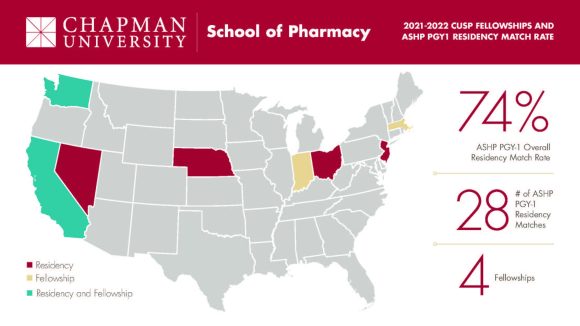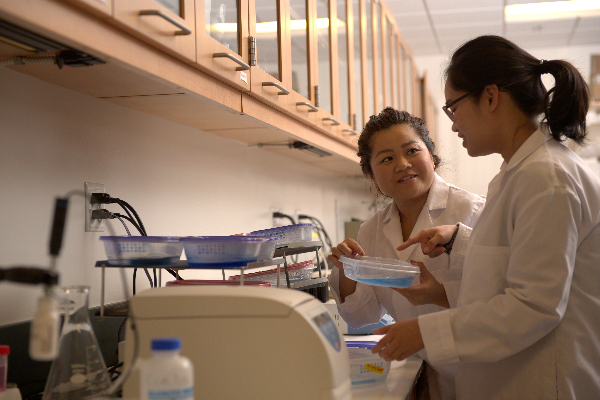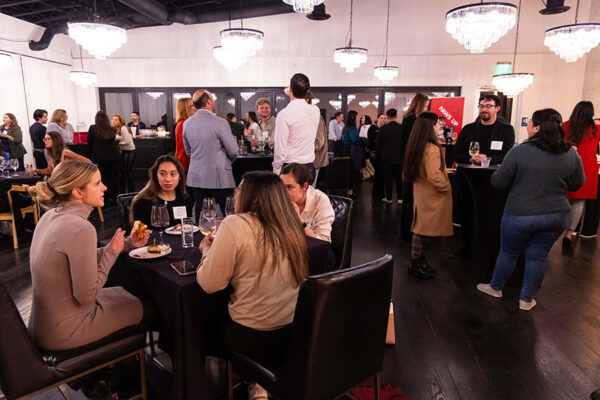Applying for pharmacy residency can be a stressful, highly competitive process for a student finishing pharmacy school.
The good news – of the Chapman University Class of 2022 pharmacy students who applied for an accredited residency program, a whopping 74% – 28 students – matched.

“This year was the highest match rate since our students embarked on this process with the Class of 2018,” says Jelena Lewis, assistant professor of pharmacy practice and director of residency and fellowship programs at the School of Pharmacy.
From New Jersey to Texas to Washington state to Southern California, Class of ’22 graduates will take the next step in their post-graduate training next month.
Residency – which is one to two years, usually in a clinical setting – is optional for pharmacy graduates. However, the knowledge and skills gained during residency are worth more to health systems, especially those looking to hire pharmacists with clinical abilities, Lewis says.
“One year of residency equals three years of training, and residents not only make connections through their respective programs, but obtain a unique skill set which they can utilize in jobs afterward,” she says. “It is definitely a good return on investment.”
There can be up to 10 applicants for each residency spot, School of Pharmacy Dean Ron Jordan says. The matching process is much like it is for doctors in that both the applicant and program must choose each other.
‘Grateful for lifelong mentorship and guidance’
Jenna Stewart ’22 had no plans to pursue residency at first, then changed her mind after attending professional development events for pharmacy students at Chapman and realizing she wanted to specialize in ambulatory and transplant care.
“I learned that to obtain a position in this specific area of pharmacy, it would require further training, making this one of my main driving forces in pursuing a residency,” she says. “Additionally, as someone who believes learning is a lifelong pursuit, I believe this year will be filled with extensive growth and development.”
Stewart matched to UC San Diego Health.
She says that Chapman’s School of Pharmacy was instrumental in her personal and professional development, particularly the professors.
“They truly strive to make the student experience worthwhile – if you ask for help, you can expect to get the support you need. I am so grateful for the lifelong mentorship and guidance I have received from the Chapman faculty,” she says.
School of Pharmacy faculty and staff offer workshops, training sessions, seminars, and mock interviews for students interested in post-graduate training.
“The various student organizations I was involved in consistently held residency preparedness workshops that helped me fine tune my CV, letter of intent, and interview skills,” says Kristin Willins ’22.
“My capstone advisor is our pediatric and oncology clinical faculty and she was constantly setting me up for success,” she adds. “I am so grateful to have had a mentor that would take the time out of their busy schedule to consistently meet with me as I was in the process of applying for various pediatric residency programs.”
Willins matched to Stanford University’s Lucile Packard Children’s Hospital.
Joslyn Wang ’22 asked assistant professors Gary Fong and Neeloufar Fakourfar to go over her goals for residency, what programs fit her best, and how to prepare for interviews.
“This helped me tremendously and it was nice to have mentors who were able to provide constructive feedback and support throughout the very strenuous residency application process,” says Wang, who matched to University of Washington Medicine in Seattle.
‘I had a lot of people help me’
Though she didn’t match to a residency in her last year at the School of Pharmacy, Mary Ngo ’19 had to start working to support her family after her mother had a stroke. But she always knew that she wanted to work in an outpatient mental health setting.
“For a few years, I didn’t think about residency,” she says. “I got involved in a lot of community organizations, wearing different hats. A lot of stuff I got involved with made me think, should I stay where I’m at?”
She later spoke with her mentor, Clinical Professor of Pharmacy Mary Gutierrez, and decided to apply for residency again.
“I reached out to so many connections to help me apply for residency. I had a lot of people help me,” says Ngo, who considers herself a non-traditional applicant.
Like Stewart, she is heading south for residency – to VA San Diego Healthcare. She hopes to apply for a second-year residency specializing in psychiatry so she can help destigmatize mental health struggles in Asian communities.
“I think keeping those connections from [Chapman are] very important,” says Ngo, who just ended three years on the School of Pharmacy’s alumni board. “Anyone who may have not matched this cycle or years prior or is practicing, it is still absolutely possible, no matter what.”
Four Class of ’22 graduates matched to fellowships – positions that can be scarce and competitive, Lewis says. While residencies focus on clinical and patient care, fellowships are more about research in a specific area.
Jessica Sams ’22 got one of the fellowships, matching to Seagen, a biotech company in Seattle. She says she always wanted to do post-graduate training and learned time management at Chapman.
Her classmates’ match rate is even more impressive because they were taking classes during the pandemic, she says.
“That’s something really great for our school, to have that many students from our class going on to do post-graduate training. It’s really special and I’m happy I got to be part of that class,” says Sams, who will be working in clinical trials for cancer therapies at Seagen. “I hope it’s encouraging for the students coming in behind us.”




